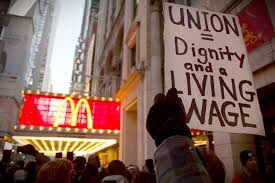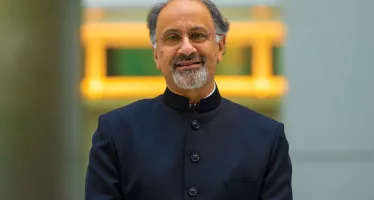Super-Size My Pay: US Fast Food Workers Walk Off Job
 Thousands of workers in the US fast food industry went on strike earlier this week to demand a super-sizing of their pay. The walkout started on Monday in New York City and has now spread to several major cities. The Fast Food Forward campaign demands a minimum pay of $15 per hour. This would more than double the current industry standard of $7.25 / hour (the federally mandated minimum hourly wage).
Thousands of workers in the US fast food industry went on strike earlier this week to demand a super-sizing of their pay. The walkout started on Monday in New York City and has now spread to several major cities. The Fast Food Forward campaign demands a minimum pay of $15 per hour. This would more than double the current industry standard of $7.25 / hour (the federally mandated minimum hourly wage).
Employers refuse to even entertain the thought of increased pay even though, just last week, McDonald’s effectively stated that its workers need a second job in order to eke out a living. Employees using that company’s “budgeting tool” – developed jointly by VISA and Wealth Watch International to instil financial literacy – soon find that the ends of a 40-hour work week at McDonald’s do not meet.
The National Restaurant Association on Wednesday put out a press statement claiming that any wage hike – however modest in scope – would “negatively impact” a fast food outlet’s ability to hire people or maintain jobs.
Meanwhile the Employment Policies Institute (EPI), a restaurant industry lobbying group, took out a full-page ad in the USA Today newspaper introducing the iServer of the future: The touch screen version of a restaurant worker. Averse of subtleties, EPI got its message across loud and clear: Improved pay actually hurts those employed in the fast food industry.
Fast Food Forward director Jonathan Westin was not impressed. “If our workers could indeed be replaced by iServers without affecting customer satisfaction, the industry would have done so already. This just goes to show the lack of respect for the human element that characterizes the fast food industry. Workers are deemed to be merely replaceable property. We’re not just demanding a living wage, we also ask for a bit of respect.”
The average fast food worker in New York earns slightly over $11,000 annually whereas the median income in the city hovers around $48,500. Last week US president Barack Obama renewed his call for the federal minimum wage to be raised to $9 an hour which would return its purchasing power to the level the minimum had at the start of the Reagan presidency in 1981.
You may have an interest in also reading…
Itaú Unibanco Forms JV With Banco BMG
Itaú Unibanco announced on Tuesday an agreement with the Banco BMG to offer, distribution and marketing of payroll services. The
World Bank Supports Increased Financing for Medium & Small Businesses in Nigeria
The World Bank’s Board of Executive Directors today approved a US$500 million International Bank for Reconstruction and Development (IBRD) credit
World Bank: How to Accelerate Growth and Progress in Developing Economies
Amid a barrage of shocks during the past four years, the global economy has proved to be surprisingly resilient. Major
















































































